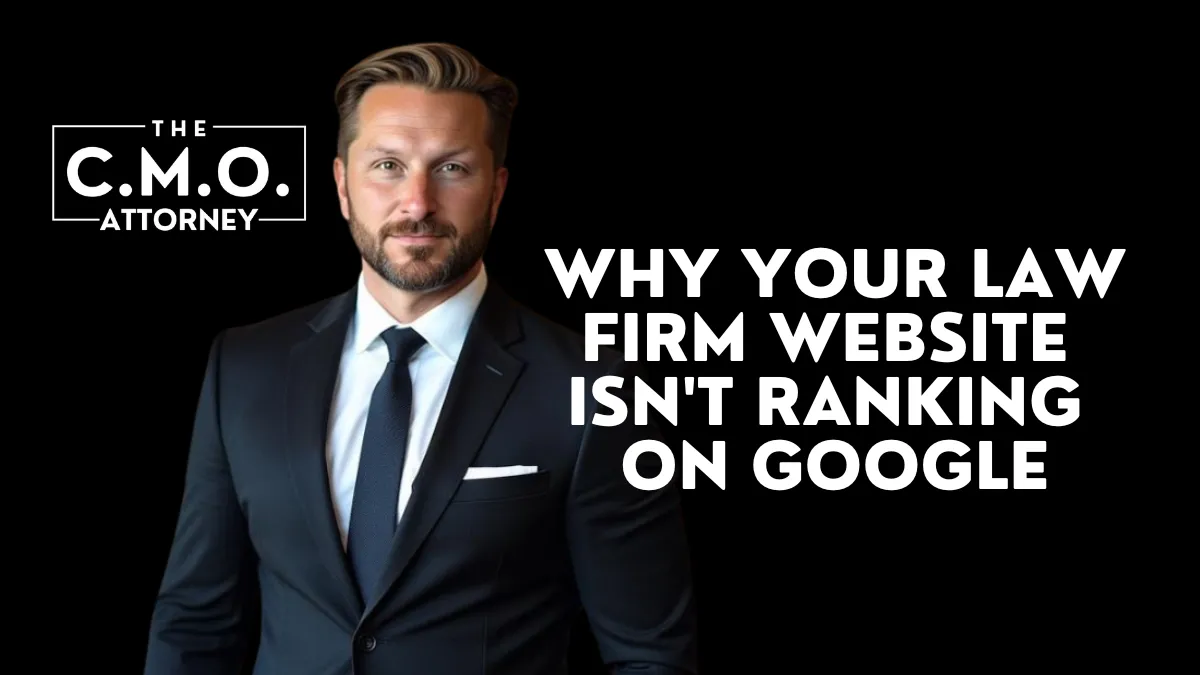 Ranking on Google is the lifeblood of acquiring new clients and growing your law firm. If your website fails to appear on the first page of search results, you’re essentially invisible to potential clients actively seeking your services. At The CMO Attorney, we have helped countless law firms elevate their online presence to dominate search rankings. Below is an exhaustive analysis of why your law firm website may not be ranking on Google—and how to fix it effectively.
Ranking on Google is the lifeblood of acquiring new clients and growing your law firm. If your website fails to appear on the first page of search results, you’re essentially invisible to potential clients actively seeking your services. At The CMO Attorney, we have helped countless law firms elevate their online presence to dominate search rankings. Below is an exhaustive analysis of why your law firm website may not be ranking on Google—and how to fix it effectively.
It’s time to sign up for a free consultation and explore how a fractional CMO can transform your firm’s trajectory.
Lack of On-Page SEO Optimization Is Killing Your Ranking on Google
The foundation of strong search rankings lies in on-page SEO. Many law firm websites overlook critical elements that Google uses to assess relevance and quality. Common pitfalls include:
-
Missing or poorly crafted meta titles and descriptions that fail to incorporate your main keywords.
-
Keyword stuffing or, conversely, a complete absence of strategically placed keywords relevant to your practice areas.
-
Duplicate content that confuses search engines and diminishes your site’s authority.
-
Lack of a well-structured internal linking system that helps distribute page authority and guides users to relevant content.
Google’s algorithms rely heavily on these on-page signals to determine your site’s relevance for specific search queries. Without properly optimized pages, your site will be overshadowed by competitors who have mastered these basics.
Your Content Doesn’t Align With What Google (Or Clients) Want
Google prioritizes websites that provide valuable, authoritative, and relevant content. Unfortunately, many law firm websites fall short by publishing thin, generic, or outdated content. This does not meet the evolving expectations of search engines or potential clients.
Typical content issues include:
-
Practice area pages that offer little more than boilerplate descriptions.
-
Blog sections that are infrequently updated and lack actionable insights.
-
Content written from a legal jargon perspective instead of addressing client concerns.
To achieve top-tier ranking on Google, your content must embody expertise, authority, and trustworthiness (E-E-A-T)—the cornerstone of Google’s quality guidelines, especially in the legal industry where accuracy and trust are paramount.
Your Website Is Not Mobile-Friendly
With mobile devices accounting for over half of all web traffic, Google employs a mobile-first indexing strategy. This means your website’s mobile version is what Google evaluates when ranking your site.
Common mobile issues undermining your ranking on Google include:
-
Non-responsive or poorly designed mobile pages.
-
Slow loading speeds exceeding three seconds.
-
Difficult navigation and missing essential features like click-to-call buttons.
Ensuring your site delivers a fast, seamless, and user-friendly experience on mobile is a critical step in climbing the search rankings.
You’re Ignoring Local SEO – A Major Ranking Killer
Most legal clients conduct geographically specific searches like “personal injury lawyer near me.” Yet many law firms fail to fully optimize their local SEO footprint, severely limiting their visibility.
Local SEO missteps include:
-
Inconsistent NAP (Name, Address, Phone) information across directories.
-
An incomplete or unclaimed Google Business Profile (GBP).
-
Lack of locally focused keywords on your website and metadata.
-
Few or no client reviews, especially 5-star Google reviews.
Optimizing for local search is indispensable for law firms looking to improve their ranking on Google Maps and localized search results.
Slow Page Speed and Poor Technical SEO
Technical website health is an often-overlooked factor that directly impacts your ranking on Google. Slow-loading pages, broken links, or missing security certificates send negative signals to Google’s crawlers and frustrate users.
Common technical issues include:
-
Oversized images that slow page loading.
-
Excessive HTTP requests and outdated code.
-
Missing SSL certificates (your website must use HTTPS).
Resolving these issues through comprehensive technical audits dramatically improves your rankings and user experience.
Lack of High-Quality Backlinks and Authority Signals
Backlinks from reputable sources remain one of the most influential factors in Google’s ranking algorithm. Many law firms either neglect backlink building or pursue spammy tactics that backfire.
Effective backlink strategies involve:
-
Building relationships with authoritative websites for white-hat guest posting.
-
Getting listed in reputable local and legal directories.
-
Earning digital PR mentions from trusted media outlets.
The right backlinks establish your website’s authority, helping you climb the rankings sustainably.
You’re Not Creating Location-Specific Practice Area Pages
Generic practice area pages fail to capture the specific local intent behind many legal searches. Google favors hyper-targeted, location-specific content.
Create pages such as:
-
“Car Accident Lawyer in Tampa”
-
“Slip and Fall Attorney in Wesley Chapel”
-
“Truck Accident Lawyer in Hillsborough County”
These pages allow you to rank for city- and county-specific queries, boosting your relevance in local markets.
Poor User Experience and Dated Design
User experience directly influences your ranking on Google through engagement metrics such as bounce rate and time on site. An outdated website or confusing interface drives visitors away, signaling low value to Google.
Key UX factors to address:
-
Modern, clean, and professional website design.
-
Clear and prominent calls to action (e.g., “Schedule a Free Consultation”).
-
Simple navigation menus that guide users intuitively.
-
Compliance with accessibility standards (ADA compliance).
A well-designed site not only improves rankings but also increases conversion rates.
No Consistent Content Marketing or Blogging Strategy
Fresh, relevant content is a vital ingredient for SEO success. Law firms that lack a steady content publishing plan miss out on countless keyword opportunities.
A strong content strategy includes:
-
Regular blog posts targeting long-tail keywords.
-
Answering specific client questions and legal concerns.
-
Incorporating internal links to boost site structure.
-
Building topical authority by covering related sub-niches.
Consistency in content creation signals to Google that your site is active and authoritative.
You’re Not Leveraging Schema Markup and Rich Snippets
Schema markup helps search engines better interpret your content and can unlock rich snippets in search results, such as star ratings and FAQs, increasing click-through rates.
Implement:
-
Local Business schema
-
Attorney schema
-
FAQ schema on service and blog pages
-
Review schema
Without schema, you lose an important competitive edge in the ranking on Google.
You’re Not Tracking SEO Performance or Conversion Metrics
A significant reason many law firms stagnate in Google rankings is the lack of effective tracking and data analysis.
You must measure:
-
Keyword rankings and shifts.
-
Click-through rates on SERPs.
-
Bounce rates and average session duration.
-
Conversion rates—form submissions, calls, consultations.
-
ROI of SEO campaigns.
At The CMO Attorney, we utilize tools like Google Analytics, Search Console, and call tracking software to continually refine SEO efforts based on real data, ensuring sustained ranking improvements.
James Frazier | The CMO Attorney | Fractional CMO for Law Firms
You Don’t Have a Clear, Data-Driven SEO Strategy
SEO is not a one-and-done task. Without a cohesive, data-driven strategy, your efforts will be disjointed and ineffective.
Our approach includes:
-
Thorough SEO audits.
-
Comprehensive keyword and competitor research.
-
Quarterly performance reviews.
-
Ongoing technical and content optimizations.
This disciplined methodology drives consistent and scalable growth in your law firm’s ranking on Google.
Start Ranking on Google Today With The CMO Attorney
If your law firm website isn’t delivering the traffic and leads it should, it’s time to take decisive action. At The CMO Attorney, we combine legal marketing expertise with cutting-edge SEO strategies to help your firm dominate Google search results.
Sign up for a free consultation today and discover the tailored plan that will unlock your firm’s full online potential.
Sources
-
Moz – Beginner’s Guide to SEO
A comprehensive resource detailing essential SEO practices from on-page to technical optimization.
https://moz.com/beginners-guide-to-seo -
Search Engine Journal – Local SEO Guide
In-depth insights into optimizing local search presence, critical for law firms targeting local clients.
https://www.searchenginejournal.com/local-seo/ -
Google Search Central – SEO Starter Guide
Google’s official recommendations on creating search-friendly websites.
https://developers.google.com/search/docs/fundamentals/seo-starter-guide
